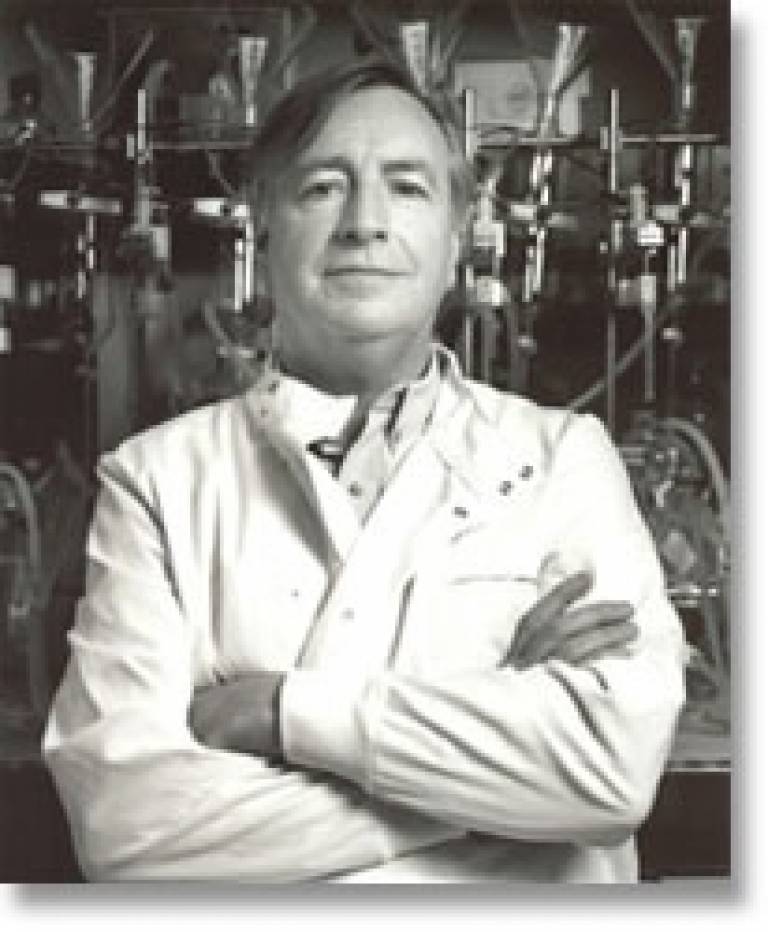Pioneering stem cell research to help cure heart damage
24 April 2008
Link:
 ucl.ac.uk/iris/browse/profile?upi=JFMAR56" target="_self">Professor John Martin
ucl.ac.uk/iris/browse/profile?upi=JFMAR56" target="_self">Professor John Martin
Emergency heart attack patients are now being injected with their own stem cells as part of pioneering research to help improve long-term recovery and quality of life for heart disease sufferers.
The first two patients to sign up for the trial had stem cells removed from their bone marrow just hours after experiencing a heart attack and arriving at Barts and The London Heart Attack Centre in East London this month.
The stem cells, or a substitute placebo developed for trial comparison purposes, were injected into the heart as soon as the patient had stabilised from emergency treatment to unblock affected arteries.
The trial, being conducted at Barts and The London Heart Attack Centre and UCL NHS Hospitals Foundation Trust (UCLH), is the first of its kind in Britain and involves a team of leading cardiologists and clinical specialists. Funding from the UK Stem Cell Foundation, including money from the London Development Agency and a private donation, has enabled the trial to take place.
Research doctors associated with Barts and The London School of Medicine and Dentistry and UCL, who designed the trial, believe it could have significant implications for treatment by reducing the risk of future heart attacks and delaying or preventing the onset of heart failure.
Senior lecturer and consultant cardiologist at Barts and The London, Dr Anthony Mathur, said: "The use of a patient's own stem cells opens up an exciting new field in medicine which is providing some remarkable results in helping the body recover and repair from various medical conditions.
"But we are yet to fully determine how effective one's own stem cells could be in curing heart disease. This trial could herald a new beginning for self-therapy which, combined with more traditional treatments, could mean quicker and more complete recovery for heart attack sufferers and less reliance on medication," he said.
"We want to see if it's possible to turn back the clock- so that the patient's bill of health is essentially restored to what it was before the heart attack occurred."
Previous clinical trials, including an ongoing research project at Barts and The London, have already begun to explore the relationship between stem cells and heart failure but this is the first time that heart attack patients have had their stem cells injected within hours of an attack.
Professor John Martin, British Heart Foundation Professor of Cardiovascular Science at UCL and Honorary Consultant at UCLH said: "We are trying to take advantage of that early window in order to maximise the positive impact of stem cell injection.
"The whole stem cell field has had a great deal of publicity and investment but we have an opportunity here to be the first trial to fully explore and provide conclusive clinical evidence about the effectiveness of these therapies in relation to the heart.
"Crucially this trial uses a patient's own cells from their own body - a more natural method than making cells in a laboratory. Given their ability to replicate other types of cells in the body, we hope the stem cell injection will result in a re-growth of heart tissue that has been damaged during a heart attack. If this can be achieved it will have a tremendous impact on thousands of lives across the UK and the world," he said.
The latest statistics show that coronary heart disease remains the UK's biggest killer with 101,000 people dying each year (British Heart Foundation - BHF Statistics, July 2007) and someone suffering a heart attack every two minutes (BHF Website). Total costs (health care, productivity losses and informal care) associated with Coronary Heart Disease are estimated at £7.9 billion a year (BHF July 2007).
The trial will involve 100 patients over the next two years, recruited from heart attack patients who are taken for emergency treatment to the Barts and The London Heart Attack Centre in Bethnal Green or the UCLH Heart Hospital in central London.
The research project will not impact on normal treatment provided to emergency heart attack patients - who all receive angioplasty treatment to open blocked arteries. Patients who agree to be part of the trial will have stem cells removed from their bone marrow immediately after this procedure is completed.
The cells are then 'purified' in a stem cell laboratory (to separate them from serum also found in bone marrow) before being reinserted into the patient's previously blocked artery.
To find out more about Professor John Martin, use the link at the top of the article.
|
Context: |
 Close
Close

